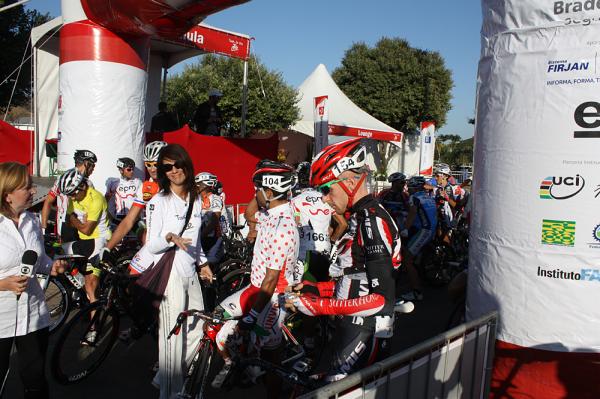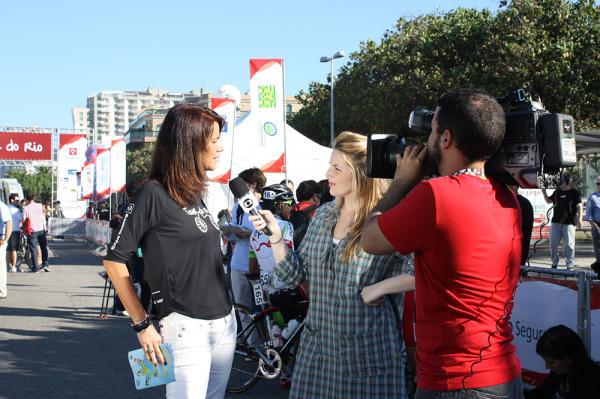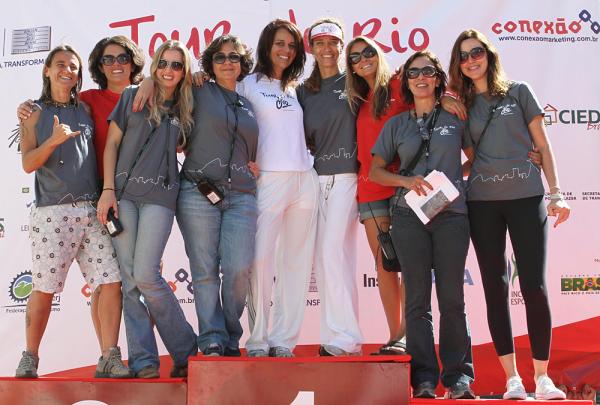Luisa Jucá – the woman behind the Tour do Rio
Evolving Brazil with a bike race



The technical meeting on the eve of the Tour do Rio gave a small insight into race organiser, Luisa Jucá. There, she was frank and claimed "the riders are like my children" and their safety was paramount over the course of the race.
Jucá is a pioneer, not just in Brazil, but in world cycling as the only female in her field. She makes the experience a one-of-a-kind at the UCI 2.2 event which takes place in the state of Rio de Janiero, greeting you with hugs and kisses several times throughout the day, waving and blowing kisses to the riders as her car drives by the peloton.
Hailing from the state of Bahia to the north, Jucá makes no excuses for her behaviour.
"We are different there," she tells Cyclingnews. "We enjoy life and are always happy. The doors to houses are open all the time – I never lock the door to my house; I don't like it. We want to allow the people we love to be able to come to us all the time."
Bringing rock n' roll to cycling
Jucá made her name managing the top musical artists in Brazil before being asked by the Brazilian Cycling Federation to bring her expertise to the world of two wheels. The journey started with small one day classics and then she started to "dream bigger" and thought that the Tour do Rio was the next logical step for the sport which does not necessarily fit with ease into her nation's culture.
"Everybody said: ‘Are you crazy? How do you think you can get away with something like that in Brazil?'" Jucá recalls. "I said of course we can. And they said: ‘But how, you're a woman?'"
The latest race content, interviews, features, reviews and expert buying guides, direct to your inbox!
And there lies what Jucá would concede as her doubter's biggest err in judgement. While it's in her nature as a native from Bahia to welcome all with open arms, you should not be fooled by the glamorous exterior.
"Let me tell you, I am a woman and a man at the same time," she declared, half laughing. "And it's not just in sport it was the same in music as well. I was the first woman in the industry there as well and it was very hard for me. I would travel around Europe alone with all these men. I will say this – when you look at me you will think that I'm a very charming woman, but it's not true!"
It's no accident that Jucá leads a close-knit team of women to keep the race ticking over. It's her way of getting the job done.
More than just a bike race
In the Tour do Rio you have a sporting event that is in many ways reflective of the developing nation. Brazil is simply dazzling with the stunningly brash Rio de Janeiro at its heart. However, one needs to remember that this is a nation that's still very much on the move – economically, demographically, and environmentally - and the result is chaos.
You only need to look at the roads both in their still-under-construction or rundown state as well as in the behaviour of its drivers. Here, lane markings mean nothing – you merge and it's up to everyone else to get out of the way. Yet somehow, and it may not be seamlessly, it works.
One of the key messages that Jucá sends with her race, is that the bike is a mode of transport that needs to be embraced.
At the end of each day's stage, bikes are given away in raffles while education programs for young and old are run in conjunction with the race. Cycling can be a way forward for Brazil, the car-reliant fifth most populous nation on the planet – and Jucá's vehicle is her race.
"It's the most important thing now," she says of her message to embrace cycling not just as a sport in a culture that lives and breathes football, but as a way of life. "You can have a future with bikes but the government needs to invest in bike paths. In 10 years from now, I hope that the bike can be a part of city life and that the bike can be very important like it is in Europe."
From little things, big things grow
Now in its second year, the Tour do Rio certainly has Rio de Janiero's attention – one only needs to look at the crowds that swell around each stage's start and finish, all clambering for a closer look at the peloton and all their equipment.
In 2012 and four years out from Rio de Janeiro's hosting of the Olympic Games, Jucá is promising a bigger and better Tour do Rio and is hopeful to have more support from the federal government.
"But now the Government can see how they can help because everything we do, all the time we have to ask for them to help us," she explains. "This is a race that's now more than just about sport, and tourism."
As a race organiser, Jucá aims high and will visit the Tour de France next year to gain an insight into how the world's biggest cycling event works. Also locked in, is an Etape du Tour and an extension of the Tour do Rio with a women's event.
"This is planting the seed," she says.
As a sports journalist and producer since 1997, Jane has covered Olympic and Commonwealth Games, rugby league, motorsport, cricket, surfing, triathlon, rugby union, and golf for print, radio, television and online. However her enduring passion has been cycling.
Jane is a former Australian Editor of Cyclingnews from 2011 to 2013 and continues to freelance within the cycling industry.